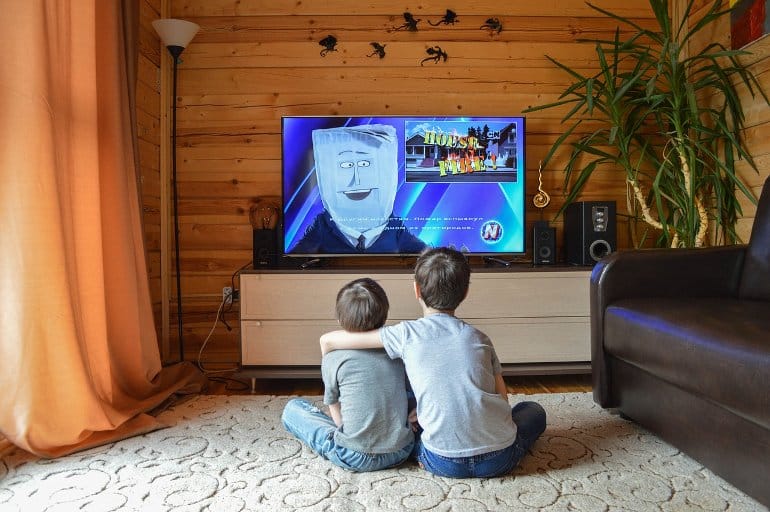Summary: Family TV time can have a beneficial effect on a child’s cognitive development, a new study reports.
Source: University of Portsmouth
Over the past 30 years, the number of television programs targeting infants has been increasing. Between 1997 and 2014, screen time doubled among children aged 0 to 2 years.
A new study, published in Frontiers in Psychology, has examined the impact passive screen use has on a young child’s cognitive development. It found that screen exposure—whether that be from a TV or mobile device—can be beneficial, depending on the context in which it’s viewed.
Researchers from the University of Portsmouth and Paris Nanterre University, France, have analyzed 478 studies published in the past two decades. Their findings found exposure to television early on may be detrimental to play, language development and executive functioning, particularly for young infants.
Dr. Eszter Somogyi, from the Department of Psychology at the University of Portsmouth, said, “We’re used to hearing that screen exposure is bad for a child and can do serious damage to their development if it’s not limited to say less than an hour a day. While it can be harmful, our study suggests the focus should be on the quality or context of what a child is watching, not the quantity.
“Weak narrative, fast-pace[d] editing, and complex stimuli can make it difficult for a child to extract or generalize information. But when screen content is appropriate for a child’s age, it’s likely to have a positive effect, particularly when it’s designed to encourage interaction.”
Studies also show screen time is more beneficial to a child if a parent or adult is present, as they can engage with them and ask questions.
“Families differ a lot in their attitudes toward and the use of media,” explained Dr. Somogyi.
“These differences in the viewing context play an important role in determining the strength and nature of TV’s impact on children’s cognitive development.
“Watching television with your child and elaborating and commenting on what is viewed can help enhance their understanding of the content, reinforcing their learning during educational programs.
“Co-viewing can also contribute to the development of their conversation skills and provides children with a role model for appropriate television viewing behavior.”
While the right type of content can do more good than harm, the study warns watching TV shouldn’t replace other learning activities, such as socializing. Instead, it is imperative to inform caregivers of children younger than 3 about the risks associated with prolonged exposure to screen viewing in the wrong context.

The authors recommend reinforcing contexts that promote learning, such as viewing chosen age-adapted content, viewing with adult supervision, and not having a second device or TV screen on in the background.
Dr. Bahia Guellaï, from the Department of Psychology at Paris Nanterre University, added, “The important ‘take home message’ here is that caregivers should keep in mind new technologies. Television or smartphones should be used as potential tools to compliment some social interactions with their young children, but not to replace it.
“I think the most important challenge of our societies for future generations is to make adults and young people aware of the risk of an unconsidered or inappropriate use of screen-use. This will help in preventing situations in which screens are used as the new type of child-minding, as it has been during the pandemic lockdowns in different countries.
“I am optimistic with the concept of finding an equilibrium between the rapid spread of new technological tools and the preservation of the beautiful nature of human relationships.”
About this cognitive development research news
Author: Press Office
Source: University of Portsmouth
Contact: Press Office – University of Portsmouth
Image: The image is in the public domain
Original Research: Open access.
“Effects of screen exposure on young children’s cognitive development: A review” by Eszter Somogyi et al. Frontiers in Psychology
Abstract
Effects of screen exposure on young children’s cognitive development: A review
The past decade has witnessed a rapid increase in the use of screen media in families, and infants are exposed to screens at younger ages than ever before.
The objective of this review is twofold: (1) to understand the correlates and demographic factors determining exposure to screens, including interactive screens, when available, and (2) to study the effects of watching screens and using touchscreens on cognitive development, during the first 3 years of life.
We argue that the effects of screen viewing depend mostly on contextual aspects of the viewing rather than on the quantity of viewing.
That context includes the behavior of adult caregivers during viewing, the watched content in relation to the child’s age, the interactivity of the screen and whether the screen is in the background or not.
Depending on the context, screen viewing can have positive, neutral or negative effects on infants’ cognition.






